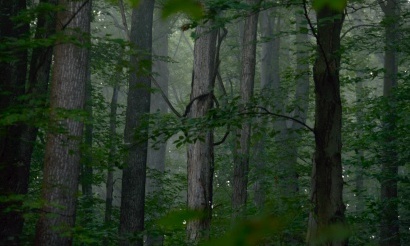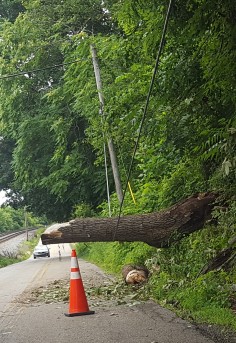 ots of city dwellers are buying houses in the country these days.
Apparently their corporate bosses are saying things like, “Sure,
you can work from home! We won't replace you with cheap workers.
Cross my heart! Oh, gotta go, I'm expecting a phone call from Bangladesh.”
ots of city dwellers are buying houses in the country these days.
Apparently their corporate bosses are saying things like, “Sure,
you can work from home! We won't replace you with cheap workers.
Cross my heart! Oh, gotta go, I'm expecting a phone call from Bangladesh.”
Okay, people are stupid. But what is it really like to live there? Well, I left suburban Maryland eleven years ago and bought a house in the country and actually lived in it. Here's what I found.
In the country, cutting down trees is our only form of entertainment
Never buy a house because of the trees around it. At least one of them will die within six months.

Trees
In suburban Maryland, if your house has trees, you advertise that fact. Being able to say “backs to woods!” adds a lot to your property value. In the country, nobody bothers to mention that; all the houses back to woods. And trees are almost magnetically attracted to the wood in your house.
It became routine: I'd come home from work and find another dead tree had fallen across my driveway. Or it would happen at night, forcing me to spend two hours cutting it up before I could get to work. For that you need a real gasoline-powered chainsaw. Those little battery-operated ones aren't powerful enough, and the battery will almost certainly be dead before you finish.
One day I went out to get the mail and discovered that the neighbors across the street had cut down every single tree on their property. Why? I guess they just couldn't stand them anymore. Or maybe there was nothing on TV.
In the country, water is your enemy
Depending on where you live, there is either not enough water or too much water. I had too much. Way too much. When it rained, I would get two inches of standing water on my driveway. Then I would get two inches of standing water in my basement.
I finally called the Roto-Rooter guy to help me figure out what was happening. He pushed a camera down my basement drain and discovered that it was fake. The drain extended six feet away from the house into the driveway where it just ended, so any water on the driveway had only one place to go: up the drainpipe into the basement.
The contractor who installed my retaining wall had a limited understanding of gravity, so he installed a drainpipe near the top instead of at the bottom, thinking that water could go uphill. It took a month, but I finally found a guy willing to install a real drainage system. They could not afford to stay in a hotel, so they slept in their truck for several days. One day I was on the other side of the house trying to figure out how to clear all the fallen trees when I noticed they had suddenly become very quiet.

In the country, trees try to listen in on your phone conversations
It turned out that they had dug up my sewage line by mistake, thinking that it was a pre-existing drainage pipe, and destroyed it. Because there was some rule about sewage lines, this meant they had to excavate my entire driveway, which they did. Then it rained and the whole thing turned to mud. Then they ran over a tree and broke the axle on their John Deere.
The State
A year later the State came along and decided they needed to “remediate” the property next to me because of all the sinkholes. It turns out that remediation means cutting down every tree in sight. Then their excavators move in, dig everything up, flatten it back down again, and plant grass, which nobody ever cuts.
One day a spring of fresh water sprouted up in the middle of my driveway. The following winter, that water poured out onto the road and froze, creating a big patch of ice. So I fixed it by digging a deep trench around my driveway to divert the water into the ditch. Problem solved.
The next spring, the State decided to finish their remediation effort by fixing my driveway. When the State does something, they don't fool around. They drilled big holes all over my property, put piezometers in the ground, then removed them, leaving giant mounds of dirt everywhere. Then they dug up my driveway and installed a six-inch diameter PVC pipe underneath. They even put new gravel on my driveway, which was nice of them, except it was the wrong type and impossible to drive on. So I had to spend the next three weekends shoveling it off.
Two months after the remediation was finished, the water sprung up again in a new place.
In the country, you do the electrical work yourself
I discovered that there was electrical wiring under the deck, underground, and in my front yard, all done with no conduit using ordinary indoor wire in violation of the electrical code.
In the basement, the previous owner had installed a shower right in front of the circuit breaker panel. They had neglected to install a drain, so whenever it was used, it must have created a large puddle of water underneath—provided of course that he or she hadn't accidentally reached up for a bar of soap and grabbed a circuit breaker by mistake.
In the front yard there was a railroad tie with an electrical receptacle attached to it. The receptacle had big black scorch marks all over it and the wire leading to it (which was, again, ordinary indoor NM wire) had long since rotted away. Another wire was strung from my shed to a streetlight. The insulation on it had also rotted away and the bare metal was touching the roof gutters.
While fixing that, I discovered the knob and tube wiring in the shed. The previous owners had the shed on a different meter for some unknown reason. I had the power company take that away and I hired a real electrician to install a new conduit and breaker box in the shed. But I had to replace the knob and tube by myself.

Trees in the winter
In the back, more NM wire wrapped around the underside of the deck and then went underground to a light—we're talking ordinary 120 volt lights, not the low-voltage ones—that pointed toward the house. They no longer worked, and there was not a single GFCI anywhere. I ripped all of it out and put one in. But I never thought to check what they had done on the inside.
One day that circuit started tripping. I called an electrician, who for some reason began testing the outlets in the living room, which I told him was the wrong circuit. The electrician said everything was fine, and if it happened again they'd send out his daddy, who was the actual electrician.
My hobby at the time was building longwave radio antennas and I'd picked up an unexplained signal coming from the wiring. So I punched about a dozen holes in the basement ceiling to investigate. I discovered junction boxes between almost every joist, some with covers and some not, all inaccessible. Then I found the problem: somebody had drilled a hole in the wall and run indoor wiring through the wall into another junction box under the deck. The wire had rotted away and water had gotten into the hole, causing arcing. The wire was encased firmly inside the rotted, scorched wood, and I had to drill through the wire to get it out. If I hadn't found it, the house would have burned down.
In the basement there were RG6 wires for cable TV going every which way, none of which worked. The telephone was unusable due to line noise. The previous owner had taken the ice maker in the refrigerator with him when he moved out. But no matter, the fridge broke down shortly thereafter, and it looked great in my front yard up on cinder blocks.
In the country, nobody ever throws anything away
Getting rid of stuff costs money. I found stacks of broken pinball machines, piles of rubbish, newspapers, and magazines, truck tires, a rusty old-fashioned bathtub hidden among the trees, a rusted-out firearm, dozens of shotgun shell casings in the yard, and a car engine in the attic. I filled six large commercial dumpsters with their trash. There was a giant slab of broken concrete next to the driveway. Under the driveway was a big pile of used bricks.
In the country, no one can find your address
Forget about buying from Amazon. Neither UPS, Fedex, nor the Deputy Sheriff could find my house. I had to rent a UPS box in a nearby town.
In the country, you maintain the roads yourself
One day the culvert at the end of my driveway got clogged. Doesn't the County clean those, you ask? As if! And it's not like the burbs where you call someone and they come out the same day. While waiting for the excavator to show up, I had to dig a two-foot wide by one-foot deep trench across my driveway by hand, and then pay 600 bucks for steel grates to build a bridge so I could get across it.
Another time, I hired some guys to build a retaining wall and went off to work. When I returned, they were just standing around and there was water everywhere. Some guy from the water company had just been there and said that 25,000 gallons of water had just mysteriously shown up on their gauges. It turned out that water had been inside the hill behind my property. This volume was equivalent to a cube 56.6 feet on a side.
The neighbors wouldn't have noticed it: in the country, you learn that creeks spring out of nowhere and then dive back underground. The point where that happens routinely gets clogged up, and so when it rains, your entire back yard, from the creek to the wall of your basement, gets flooded.
In the country, cars will smash into your property
My property was on a steep slope next to the road. Every year, leaves would clog up the ditch. In the country, you have to take care of this by yourself. In my case cleaning the ditch was impossible. I had to stand on road with a rake and hop onto the bank every time a car came by.
Most places follow a construction code that specifies that a road must have an angled shoulder. Without it, vehicles can drift off the pavement edge. Their tires get caught on the edge. When the driver corrects, the vehicle swerves into oncoming traffic. I knew a teenager who was killed by this. Even a two-inch drop-off is considered unsafe.
On the road in front of my house the drop-off was over two feet. The shoulder of the road was completely eroded: there was the asphalt, the white line, and--bam--a straight vertical two-foot drop. When a car hit that drop at sixty miles an hour, the resulting crash produced a loud, distinctive noise.
Originally I had large rocks, each about 300 pounds, on either side of my driveway. Now there is only one. One day somebody ran off the road going 80 miles per hour and crashed into my driveway. This 300 pound rock flew across my 26-foot wide driveway and landed in the ditch about 75 feet further up the road where it remains to this day, unmoveable, with a big piece of somebody's car stuck underneath it.
In the country, the humans are dangerous
Aside from the crooks and the passive-aggressive people, the biggest advantage to the country is that there are no city slickers. But we have rural people, who are even worse. The previous owners had installed a fake plastic pond and put fish in it, so they could advertise that the house had a pond. They assured me these were special fish that could survive being frozen in the winter. Alas, they were mistaken.
I described here the effort I had to make keeping the drug addicts out. The doors had flimsy strike plates, so a burglar easily kicked it open two weeks after I moved in. Another burglar used a bolt cutter to remove my padlock from my shed and stole my string trimmer, chainsaw, and a can of gas. But even they wouldn't touch my Sears lawnmower with the broken front wheel drive. They also didn't touch my pile of old VCRs in the shed, which were covered with squirrel urine.
One neighbor would take his stereo speakers outside every day and blare rock music into the neighborhood, at full volume, between 11 am and 11 pm. Another time some lady tried to turn around in my driveway and somehow managed to get her car hung up on some rocks. When I was outside, I'd often hear the distinctive thump of stray bullets slamming into the side of the hill. And on two occasions, the shooting range nearby caught fire, providing Battle-of-the-Bulge-style entertainment for hours as their ammunition cooked off. Then there were the kids in their pickup truck who decided to launch fireworks from the vacant property across the street. We're talking real, professional, mortar-launched fireworks. I have to admit they were pretty.
When my water line broke, the plumber recommended excavating and replacing the entire thing—all 150 yards of it, at enormous expense—and only relented when I told him that the water line and the electrical line (yes, not in a conduit) cross within inches of each other. My roof leaked due to a cracked chimney. It took a year to find someone to rebuild it. Snakes sneak up to you while you're outside reading a book.
But there are some nice things as well. On the two or three nights every year when the sky is clear you can see the stars. Well, you could, if the trees weren't in the way. And when things get really bad you can sit outside and sob in despair, and nobody will be able to hear you. The only sounds will be the vultures silently circling overhead, the mosquitoes biting you to pieces, and the faint sizzling sound of your electric wiring.
DO NOT COME OUT HERE! Don't buy a house here, either. If you must visit, please sleep out in the woods under the stars. As we country folk all know, wild animals are all cuddly and won't try to eat you at all . . . probably.
apr 17 2021, 7:18 am
